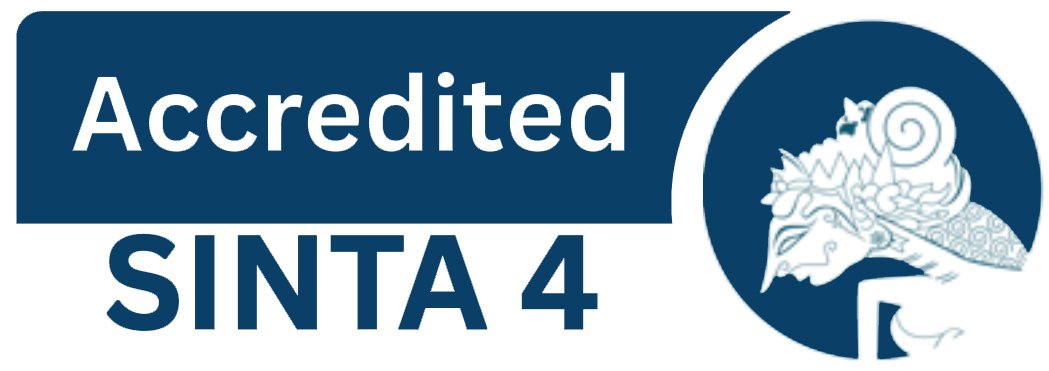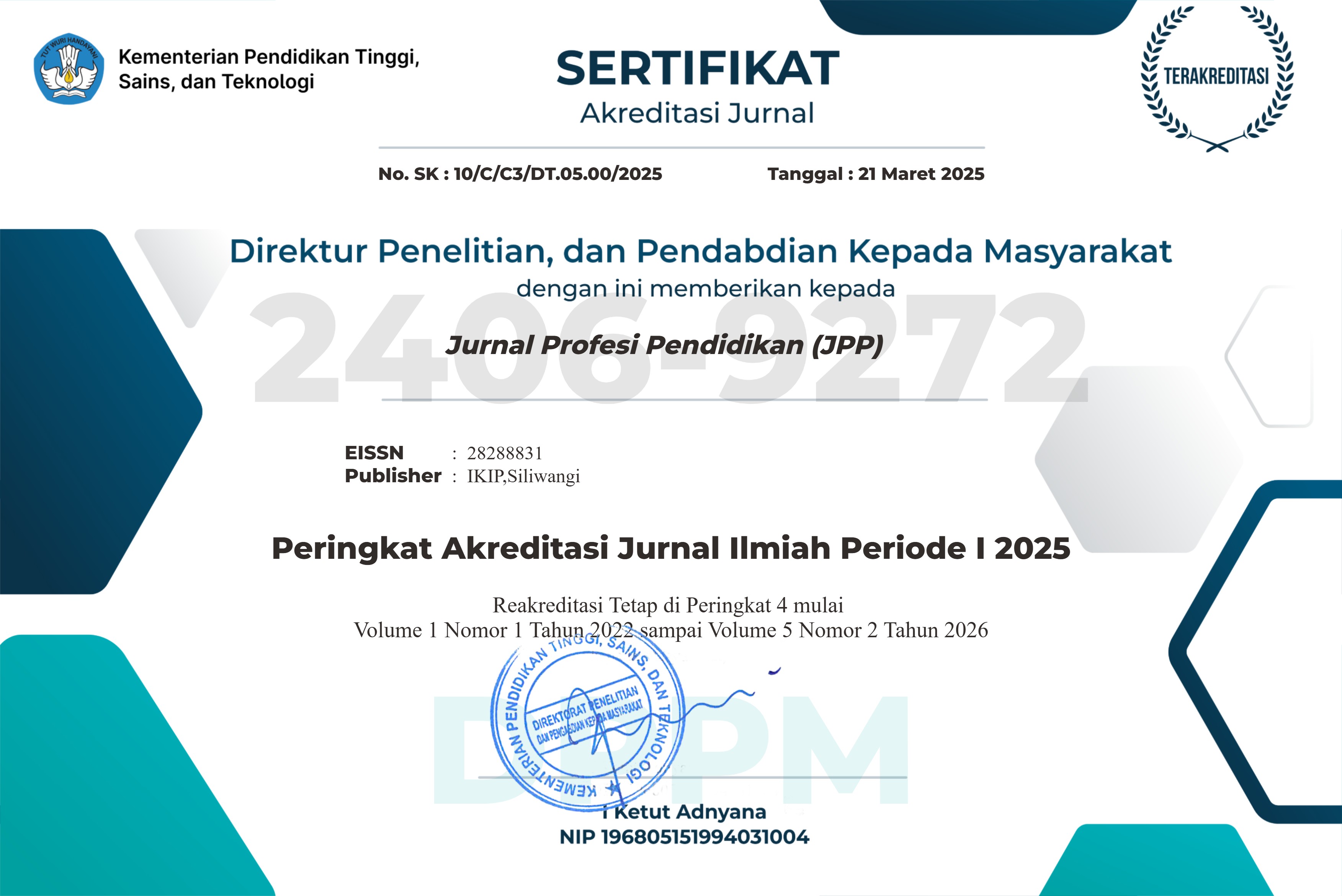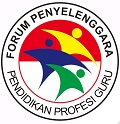Peningkatan Pemecahan Masalah Matematika Menggunakan Model Pembelajaran Problem Based Learning Berbantuan Bar Modelling Untuk Siswa Sekolah Dasar
DOI:
https://doi.org/10.22460/jpp.v1i1.10363Kata Kunci:
matematika, pemecahan masalah, model barAbstrak
Salah satu materi dalam pelajaran matematika di sekolah dasar yang sering menjadi masalah bagi siswa adalah  pecahan.  Siswa  sering kesulitan  dalam  memahami  pemecahan masalah terutama  dalam menyelesaikan soal cerita yang berkaitan dengan pecahan. Tujuan penelitian ini adalah untuk mengkaji dan mengetahui ketercapaian peningkatan pemecahan masalah matematika menggunakan model pembelajaran problem based learning berbantuan bar moddeling untuk siswa sekolah dasar. Penelitian ini menggunakan metode kualitatif. Hasil pembelajaran matematika terhadap pemecahan masalah tentang konsep pecahan menggunakan bar modelling  dengan beberapa  tahapan penelitian.  Diantaranya adalah  pemberian  materi  ajar  sesuai skenario pembelajaran dengan menggunakan bar modelling, evaluasi akhir berupa tes tertulis yang diperoleh masing-masing siswa dibandingkan dengan kriteria ketuntasan minimal (KKM). Selain itu, hail penelitian menunjukkan bahwa siswa kelas VI SDK Yahya memiliki respon positif terhadap pembelajaran matematika dengan bar modelling.
Referensi
Firdaus, A. R., Wardani, D. S., Altaftazani, D. H., Kelana, J. B., & Rahayu, G. D. S. (2020, October). Mathematics learning in elementary school through engineering design process method with STEM approach. In Journal of Physics: Conference Series (Vol. 1657, No. 1, p. 012044). IOP Publishing. https://doi.org/10.1088/1742-6596/1657/1/012044.
Nainggolan, E. Y. (2019). Penerapan Pembelajaran Problem Based Learning untuk Meningkatkan Kemampuan Pemecahan Masalah Siswa dalam Pembelajaran Matematika. Mimbar.
Putri, A., Sumardani, D., Rahayu, W., Hajizah, M. N., & Rahman, A. (2020). KEMAMPUAN LITERASI MATEMATIKA MENGGUNAKAN BAR MODEL PADA MATERI ALJABAR. AKSIOMA: Jurnal Program Studi Pendidikan Matematika. https://doi.org/10.24127/ajpm.v9i2.2744.
Ramadhani, R. (2018). The enhancement of mathematical problem solving ability and self-confidence of students through problem based learning. Jurnal Riset Pendidikan Matematika. https://doi.org/10.21831/jrpm.v5i1.13269.
Rofi’ah, N., Ansori, H., & Mawaddah, S. (2019). ANALISIS KESALAHAN SISWA DALAM MENYELESAIKAN SOAL CERITA MATEMATIKA BERDASARKAN LANGKAH PENYELESAIAN POLYA. EDU-MAT: Jurnal Pendidikan Matematika. https://doi.org/10.20527/edumat.v7i2.7379.
Rosiyanti, H., & Widyasari, N. (2017). Pengembangan Buku Ajar Bar Modelling Berbasis Pemecahan Masalah Pada Tema Berhemat Energi. In FIBONACCI: Jurnal Pendidikan Matematika dan Matematika.
Sugiyono. (2016). Metode Penelitian Kuantitatif, Kualitatif dan R&D. Bandung: Alfabeta.
Unduhan
Diterbitkan
Cara Mengutip
Terbitan
Bagian
Lisensi
Hak Cipta (c) 2022 JPP (Jurnal Profesi Pendidikan)

Artikel ini berlisensiCreative Commons Attribution-ShareAlike 4.0 International License.
Authors who publish with the Journal Pendidikan Profesi (JPP) agree to the following terms:
- Authors retain copyright and grant the journal the right of first publication with the work simultaneously licensed under a Creative Commons Attribution License (CC BY-SA 4.0) that allows others to share the work with an acknowledgment of the work's authorship and initial publication in this journal.
- Authors are able to enter into separate, additional contractual arrangements for the non-exclusive distribution of the journal's published version of the work (e.g., post it to an institutional repository or publish it in a book), with an acknowledgment of its initial publication in this journal.
- Authors are permitted and encouraged to post their work online (e.g., in institutional repositories or on their website) prior to and during the submission process, as it can lead to productive exchanges, as well as earlier and greater citation of published work. (See The Effect of Open Access)
Artikel Serupa
- Enur Nurmawati, MENINGKATKAN MOTIVASI DAN HASIL BELAJAR MATEMATIKA PESERTA DIDIK KELAS VII DI SMPN 3 CIPATAT MELALUI PENERAPAN MODEL PEMBELAJARAN PROBLEM BASED LEARNING , Jurnal Profesi Pendidikan: Vol 3 No 1 (2024): June
- Ayang Wike Sintia, Jajang Bayu Kelana, Anugrah Ramadhan Firdaus, PENINGKATAN KETERAMPILAN BERPIKIR KRITIS PADA MATA PELAJARAN IPA DENGAN MENGGUNAKAN MODEL PEMBELAJARAN STEM (SCIENCE, TECHNOLOGY, ENGINEERING, AND MATHEMATICS) DI KELAS VI SEKOLAH DASAR , Jurnal Profesi Pendidikan: Vol 3 No 1 (2024): June
- Kurnia Akbar, Citadewi Aditya, Lathifah Rizki, Nelly Ade Karisma, Selvi Novitasari, Widya Sulistia, Yulianti Yulianti, Penerapan Model Problem Based Learning Berbantuan Komik Digital untuk Meningkatkan Pemahaman Konsep Matematis Siswa pada Materi Perkalian Pecahan di Kelas V Sekolah Dasar , Jurnal Profesi Pendidikan: Vol 3 No 2 (2024): December
- Windi Triwahyuni, Jajang Bayu Kelana, Duhita Savira Wardani, Penggunaan Model Kooperatif Tipe Picture And Picture Berbantuan Aplikasi Canva Untuk Meningkatkan Kemampuan Berpikir Kreatif Siswa Pada Materi Daur Hidup Hewan Kelas IV Sekolah Dasar , Jurnal Profesi Pendidikan: Vol 3 No 2 (2024): December
- Nina Vania, Wahyu Hidayat, Trisna Nugraha, Penggunaan Model Problem Based Learning Berbantuan Video Powtoon Untuk Meningkatkan Kemampuan Berpikir Kritis Siswa Kelas III Sekolah Dasar , Jurnal Profesi Pendidikan: Vol 3 No 1 (2024): June
- Asih Martiasari, Jajang Bayu Kelana, Peningkatan Pemahaman Konsep Matematika Menggunakan Model Pembelajaran Problem Based Learning Berbantuan Media Manipulatif Untuk Siswa Sekolah Dasar , Jurnal Profesi Pendidikan: Vol 1 No 1 (2022): June
- Husni Qodariah, Sylvia Rabbani, Pengembangan Media Pembelajaran Ayam MSP Materi Satuan Panjang Berbantuan Aplikasi Scratch Dengan Menggunakan Model Discovery Learning Untuk Meningkatkan Pemahaman Konsep Matematika Pada Siswa SD Kelas III , Jurnal Profesi Pendidikan: Vol 1 No 2 (2022): December
- Izzah Millati, Agustina Tyas Asri Hardini, Meningkatkan Sikap Kerjasama Siswa Kelas V Melalui Penerapan Model Problem Based Learning pada Mata Pelajaran Pendidikan Pancasila , Jurnal Profesi Pendidikan: Vol 4 No 1 (2025): June
- Isyfa Robi’ah Al-Adawiyah, Neneng Kurnia Sandi, Rima Rahmawati Permana, Sulastri Nurmaya, Ryan Dwi Puspita, ANALISIS MODEL PEMBELAJARAN PROJEK BASED LERANING (PjBL)TERHADAP KONSENTRASI BELAJAR PESERTA DIDIK DI SEKOLAH DASAR , Jurnal Profesi Pendidikan: Vol 3 No 1 (2024): June
- Siti Patimah, Jajang Bayu Kelana, Pengembangan Bahan Ajar Menggunakan Model Problem Based Learning Berbantuan Aplikasi Powerpoint untuk Meningkatkan Kemampuan Pemahaman Konsep Matematika Pada Siswa Kelas IV , Jurnal Profesi Pendidikan: Vol 2 No 1 (2023): June
Anda juga bisa Mulai pencarian similarity tingkat lanjut untuk artikel ini.


















